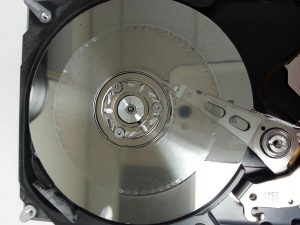If your external hard drive causes your computer to freeze, operate slowly, or fail to boot, there’s a good chance that you’re dealing with corruption of the filesystem or a physical hard drive issue.
Other issues can also cause these symptoms:
- A faulty USB cable.
- Damaged USB ports.
- Damage to the connection between the hard disk drive (HDD) and its portable enclosure.
To determine the cause of the issue — and restore your data — you’ll need to take a cautious approach. If your hard drive is failing, every attempt to boot the drive could make the problem worse.
In other words, you don’t want to experiment. Here’s how to troubleshoot the issue.
1. Evaluate the symptoms that preceded the hard drive failure.
An external hard drive can cause a computer to freeze or slow down if the operating system (OS) is unable to recognize the device. This occurs when key operating data is lost, corrupt, or inaccessible.
As we discussed in the intro, this usually happens when one or more of the hard drive’s components have failed physically. Common signs of physical hard drive failure include:
- Unusual noises such as clicking, whirring, or grinding sounds.
- Failure to recognize.
- Attempting to open files results in “file corrupted” or “file not found” errors.
Learn more about the common symptoms of hard drive failure.
You should also evaluate anything that happened prior to the failure. For example, if you unplugged the hard drive while it was writing data or shut down your computer unexpectedly, there’s a good chance that you’re dealing with a physical issue.
Related: What Is a Lost Hard Drive Partition?
2. If the data is important, don’t take risks.
Datarecovery.com is the world leader in hard drive data recovery services, and we’re certainly biased towards professional intervention.
However, we regularly receive hard drives that have been damaged by do-it-yourself recovery attempts. If you cannot recreate the data on a damaged external hard drive, we strongly recommend seeking assistance from a professional data recovery provider.
Here’s why: When hard drives fail, the read/write heads that access magnetic data may come into direct contact with the platters, which hold those magnetic charges. This can quickly remove the magnetic material from the platters, which renders data unrecoverable.
Here’s an example of a hard drive with severe platter damage (also called scoring). Every time you operate a failed hard drive, you run the risk of exacerbating platter damage.

Rotational damage to hard drive platters.
Even if your hard drive has not suffered a head crash, at-home recovery attempts may make the problem worse. For instance, many websites recommend running the Windows utility chkdsk to correct errors with external hard drive partitions — but that utility is not designed for partition recovery.
If the hard drive has issues with the alignment of its read/write heads, firmware issues, or widespread data corruption, running chkdsk can cause permanent data loss (or make professional data recovery services more expensive).
Related: How to Clone Hard Disks with ddrescue
3. If the data is not important, follow these steps.
In some cases, professional data recovery isn’t a practical option. You might be able to recreate the data on the drive, but you simply don’t want to go through the work — in that case, you can attempt recovery on your own. But be aware: By attempting to recover your data, you’re taking a risk.
If you absolutely need the data, call 1-800-237-4200 to speak with an expert or submit a case online. Datarecovery.com provides risk-free evaluations, and we support our hard drive data recovery services with a no data, no charge guarantee: If we can’t recover the data you request, there’s no charge for the attempt.
With that said, if you can risk permanent data loss, there are a few things you can try. Your external hard drive may freeze your system if it has a bad connection. To check whether this is the case, plug the drive into another computer using a new USB cable (or other data cable, depending on the device).
If that doesn’t work, your drive may be freezing your computer due to a corrupt filesystem. This is common when drives lose power during operation.
You can use third-party utilities to attempt to fix the issue — just remember, you’re risking platter damage by running software. Datarecovery.com does not recommend specific data recovery utilities, for the reasons we’ve outlined above. However, we offer a logical data recovery guide with tips for selecting software and following the best industry practices when running the tool.
Some critical tips to keep in mind when using software:
- Never install the software directly to the device that stores the target data.
- Always create a clone of the damaged drive, then run the software on the clone. While we don’t recommend specific tools, free resources are available including Clonezilla and Macrium Reflect.
- Never run chkdsk or similar disk health utilities on an unresponsive hard drive.
For additional guidance, call 1-800-237-4200. To schedule a free evaluation at one of our full-service data recovery laboratories, submit a case online.





